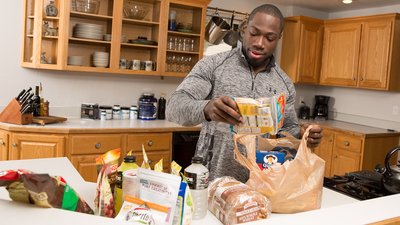In a perfect world, we could all stroll into the local health food store and buy all the foods that make up the perfect diet—without giving a thought to the crushing, "whole paycheck" cost. Alas, most of us must shop a lot smarter than that. It might mean settling for spotted instead of perfect fruit, or buying your granola and honey in bulk. But there are ways to get what you need for less.
Taking the time to shop smart isn't a bad price to pay for keeping your kitchen stocked with high quality, nutritious foods for far less money than you might think possible. Here's how.
1. Use digital and paper coupons
Using a shoppers' club card doesn't mean you automatically get all the discounts. Download your store's apps, then attach digital coupons to your club card. Grab the food flyer on your way into the store and find the paper coupons you want. Combine paper coupons, digital coupons, and your shoppers' club card for great deals. And by using shopping cards and digital coupons, the store can track what you buy and give you more coupons for the things you like to buy.

2. Buy in bulk and wholesale
Big-box stores like Costco Wholesale, Sam's Club, and BJ's Wholesale Club stock high-quality bulk foods, including all-natural and organic products. You pay more up front (plus any membership fees) for large quantities of food. But the price per unit is usually much lower than at a regular grocery store.
3. Shop seasonally and locally
Shop at your local farmers market, and you can often snag very fresh food at seriously discounted prices—plus you'll be supporting the local economy. Be prepared to pay cash. You can also join a local Community Supported Agriculture (CSA) program. For a flat fee, CSA farmers will give you a box filled with whatever fruits and veggies they picked that week. Go to localharvest.org to search for farmers markets and CSAs in your area.

4. Be a flexible shopper
Sometimes, you need to be flexible to be frugal. It might take shopping at multiple stores to maximize your savings. Check the paper and the internet for the best local food buys. That ritzy store up the street might have a special that knocks the socks off the big-box store across town. And you may find not only great prices but also new foods to put on the table. Just be sure to factor the amount of gas and time involved into your cost calculations.
5. Plan your shopping with your freezer in mind
With enough freezer space, you can save money by buying in bulk and in season. Affix labels so you know when you packed each item. Then, plan a meal using one or more of your frozen foods each week. That way, you won't end up with those mysterious, freezer-burn-covered shapes in the bottom of the freezer drawer.

6. Plan ahead to avoid waste
Healthy foods are often fresh foods (think fruits, veggies, meats, dairy) that don't last long. Before you buy them, make sure you know when you'll use them. If you have lots of leftovers, put a date (and maybe the name of the dish) on the container. And if something is about to go bad, cook it into something good before it does. Example: Got lots of extra bananas? Make banana bread before they all turn black.
7. Compare apples to apples
When comparing prices, make sure you're comparing the same units. If you find a bag of pre-cut broccoli at $5 per bag and heads of broccoli at $1.59 per pound, do the math. If the bag has four pounds of broccoli in it, that may be the better deal (it helps to be able to look inside the bag to see what you're paying for). Some stores provide price tags on the shelves that show cost per unit, which makes comparison shopping a lot easier.

8. Mix it up!
Mix cheaper foods in with the more expensive stuff. Cabbage is super cheap (and delicious). Combine it with costlier asparagus to give yourself a full plate of veggies without the high cost. Instead of serving each person an entire chicken breast, mix less chicken with more vegetables and grains to make a well-balanced and less-expensive meal.
9. Do a shopping post-mortem with your receipts
What do you spend your grocery money on? If it's for reasonably nutritious things that you like to eat, then consider it money well spent. But if you buy things because you think you should be eating them—but never finish what's on your plate—find better foods to spend your money on.
10. Account for your protein supplements
When budgeting, remember that every dollar you spend on supplements is a dollar less you have to spend on protein from whole food. Make sure your shopping and food budgeting reflects the fact that, for all intents and purposes, supplements are food too!


